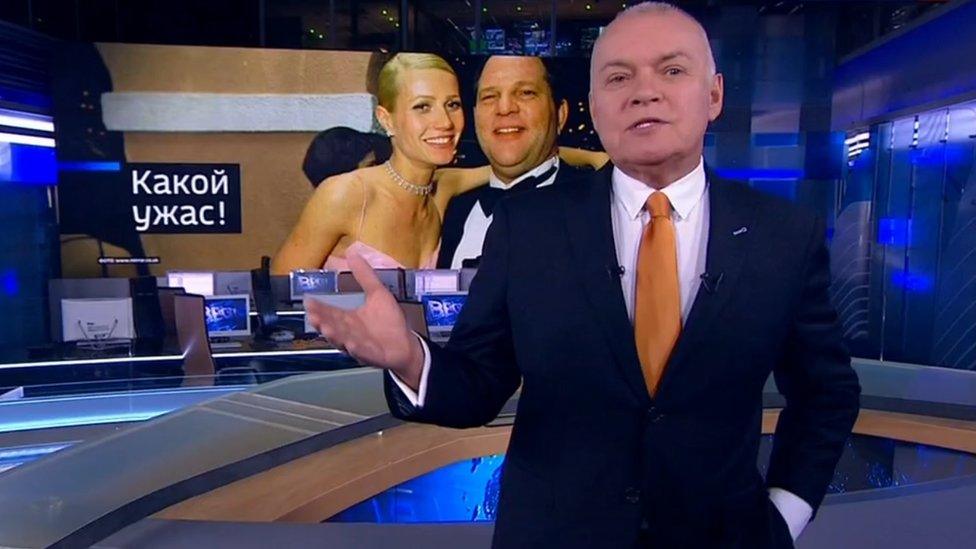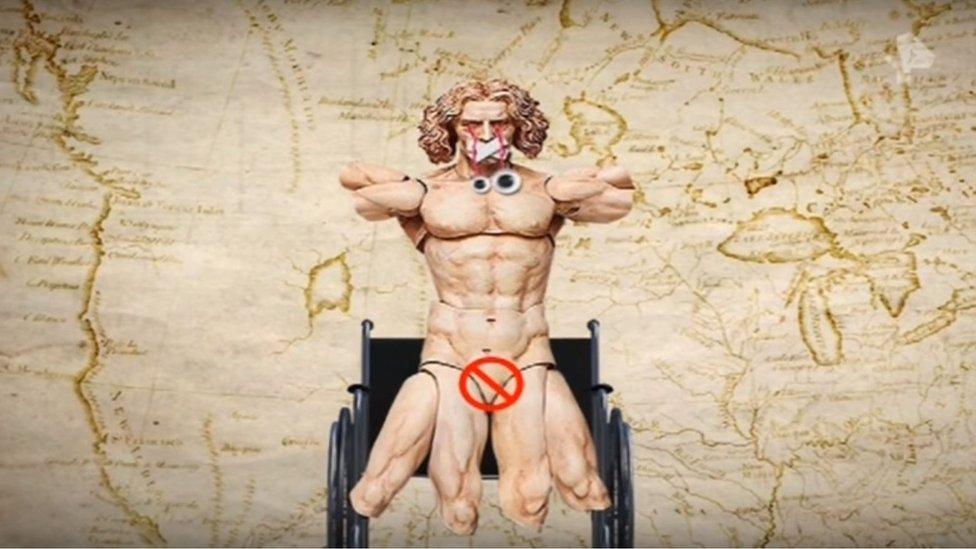Russian TV defends men over sex pest claims
- Published

"Shock horror!" Russian state TV airs some sarcastic views on sexual harassment claims in the West
Russian TV has broadcast sharp criticism of the Western focus on sexual harassment - and some of the critics show little or no sympathy for the women involved.
The very idea of gender equality frequently comes under attack.
Dmitry Kiselyov, a major player in the Kremlin's media machine, hosts a Sunday news show. "What did they expect?" he asked, referring to alleged victims of sexual harassment in Hollywood. "They went up to a man's hotel room on their own, without compulsion."
He added, however, that he in no way wanted to advocate sexual harassment in the workplace.
Women's allegations against Hollywood producer Harvey Weinstein triggered dozens of rape and harassment claims against male celebrities and politicians in the US and Western Europe.
'Great hypocrisy'
A host on Russian state TV's Channel One, Valery Fadeyev, bemoaned "the great battle against men's desire for women". He spoke of "great hypocrisy" supposedly exhibited by those who tried to thwart such desire.
There is sarcasm too. Ren TV, a fiercely pro-Kremlin channel, showed a graphic depicting a modern ideal man fit to become the next US president: "An obvious impotent - limbless so he can't touch women, a mute so he can't make salacious jokes and blind so he can't leer at them lasciviously."

Ren TV sarcastically reimagines the modern man
Other popular opinions voiced on Russian TV include claims that sexual harassment allegations are symptoms of political correctness gone mad or of plots to bring down leading politicians.
Conservative values
This rhetoric comes against a background of a deeply conservative political agenda promoted by the Kremlin. The Orthodox Church plays a key role in modern Russia - too big, some say - and forms a key pillar of Russian statehood.
The current tensions with the West are often explained by the need to defend conservative or "traditional" values against an onslaught of perceived foreign decadence.
But while some in Russia include ideas of male superiority among these values, women play an active role in public life.
There are women in parliament and government, and the country's international broadcaster RT - also known as Russia Today - is headed by a woman, Margarita Simonyan.
According to the UN, Russia ranks 141st out of 186 countries in terms of women's representation, external in government, with three women in the cabinet (9.7%).
Parliamentary representation is slightly higher: Russia is 129th out of 193 countries, with women occupying 71 seats in the 450-seat Duma (lower house). In the Federation Council (upper house) there are 29 women, out of 170 senators.
This year, several women declared their intention to run for president in the 2018 election. They include TV journalist and celebrity Ksenia Sobchak.
But do they stand a chance? Not according to a recent talk show on NTV, a popular television channel.

"Are chicks up in arms?" NTV television asks
"Allowing women to be in charge means changing traditional values, it's a path to the death of humanity," said one guest on the show, Alena Sterligova. Her husband, a businessman, earlier stirred controversy by banning gay people from his grocery stores.
Mikhail Shakhnazarov - who happens to work for RT - echoed the sentiment. "A woman who becomes president stops being a woman, I'm sorry," he told the NTV audience. "If someone is working around the clock and not seeing daylight, it's difficult to remain a woman," he said, triggering applause in the studio.
The conservative rhetoric pushed by mainstream media and the state partly reflects deep-rooted stereotypes in Russian society which affect women's lives.
Little girls are often told at school that they should not seek professional success, but rather strive to find a good and caring husband. Some are told the same by their parents and relatives.
If you're a young woman, sometimes even an ordinary visit to the doctor can end with a warning: "If you're 25, you'd better start thinking about children before it is too late".
Later in life, women often face criticism and ridicule - be it jokes about their driving skills, career choices or prospects of finding a partner.
Although these stereotypes are hard to fight, they do not seem to stop some women from challenging the status quo. Video bloggers, media managers, soldiers - modern Russian women have mastered many professions that their mothers and grandmothers couldn't dream of.
According to Unesco, 29% of people in scientific research worldwide are women, compared to 41% in Russia. In the UK, about 4% of inventors are women, whereas the figure is 15% in Russia.
BBC Monitoring, external reports and analyses news from TV, radio, web and print media around the world. For more reports from BBC Monitoring, click here. You can follow BBC Monitoring on Twitter, external and Facebook, external.